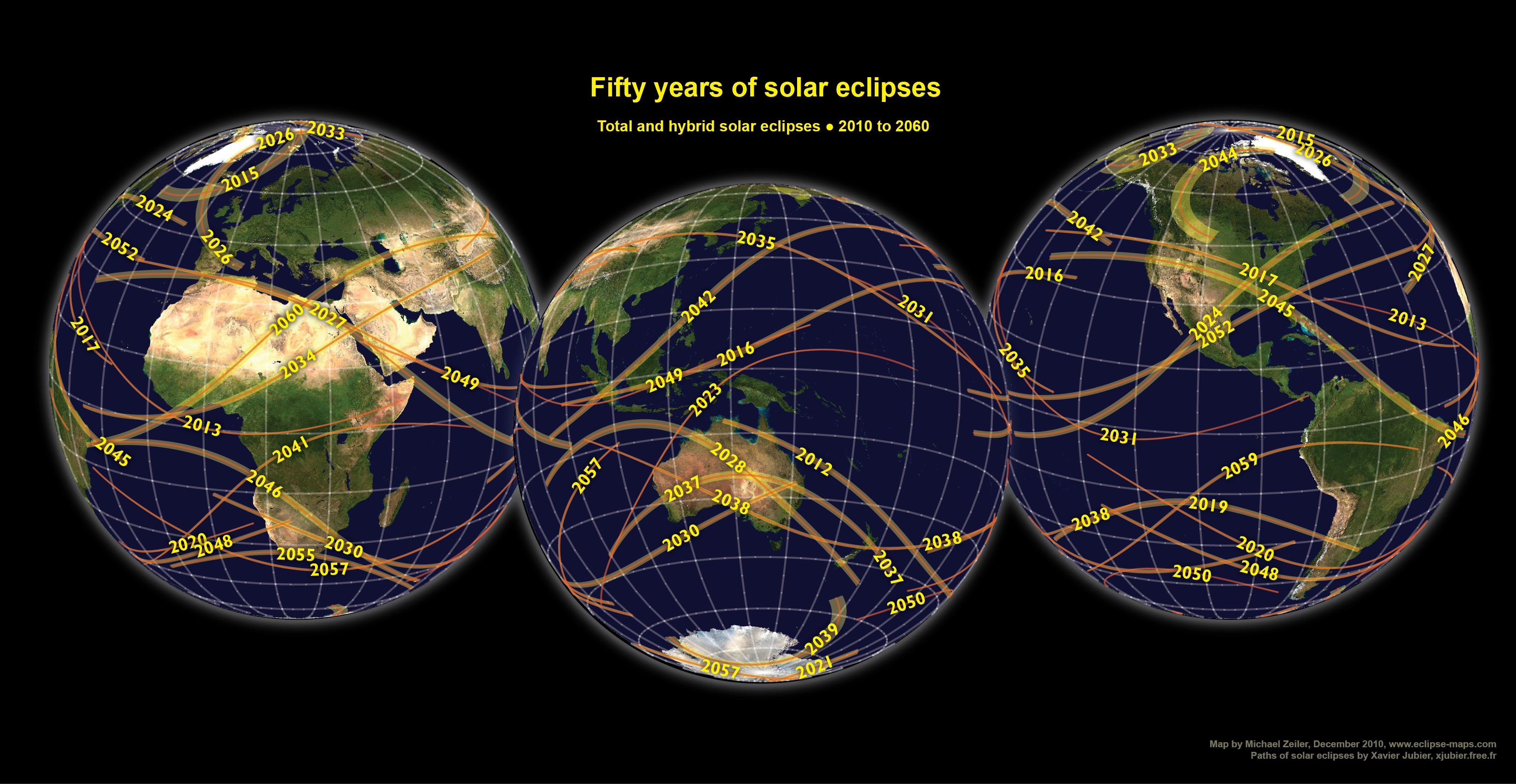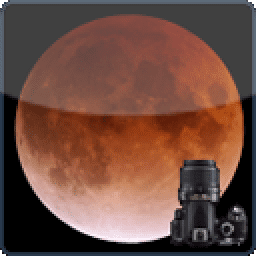Lunar Eclipse Maestro controls up to four USB or Firewire connected cameras (Nikon and Canon DSLRs, plus Nikon Coolpix line) and up to four USB or Ethernet connected SBIG CCD cameras with their filter wheels during an eclipse so that you can be free to concentrate on observing the event visually. Actions can be preprogrammed according to a script. Observer position (latitude and longitude coordinates, altitude) is used to calculate local circumstances so that camera actions can be referenced to specific eclipse events. Refraction and deltaT correction supported. Moon-Earth's umbra/penumbra diagram and large event countdown display. Eclipse map with mouse-over geographic cursor coordinates and eclipse type info to indicate where to go. A maximum eclipse diagram at the mouse-over location can also be displayed.
- Live View (Lv) mode support to allow easier focussing and exposure compensation.
- Night vision mode to preserve your dark adaptation for totality.
- Exposure Calculator to find the best exposure for each eclipse event.
- Support for all Nikon and Canon DSLRs.
- Support for all SBIG CCD cameras with their filter wheels.
- Sky chart.
- PDF exports.
- etc...
If you are in Australia, parts of the western US, western South America, or in South-East Asia, you will see a Super Full Moon totally eclipsed for about 14 minutes during this total lunar eclipse, weather permitting.

What This Lunar Eclipse Looks Like
Total lunar eclipses are also sometimes called Blood Moons because of the reddish-orange glow the Moon takes on during the eclipse. On the day of the eclipse, the Full Moon will be closest to the Earth, so it may look a larger in the sky, making it a Blood Super Moon eclipse. Total lunar eclipses are also sometimes called Blood Moons because of the reddish-orange glow the Moon takes on during the eclipse. On the day of the eclipse, the Full Moon will be closest to the Earth, so it may look a larger in the sky, making it a Blood Super Moon eclipse. Lunar Eclipse Maestrocontrols up to four USB or Firewire connected cameras (Nikon, Canonand PanasonicDSLRs, Ricoh, plus Nikon Coolpix line) and up to four USB or Ethernet connected SBIGCCD cameras with their filter wheels during a lunar eclipse, so that you can be free to concentrate on observing the event visually. Lunar Eclipse Maestro To compute all the dates and types of eclipses of the Moon, a lunar eclipse calculatoris available for your own use. A time exposure calculatoris there to.
The curvature of the shadow's path and the apparent rotation of the Moon's disk is due to the Earth's rotation.
Where to See the Eclipse
Try our new interactive eclipse maps. Zoom in and search for accurate eclipse times and visualizations for any location.
Regions seeing, at least, some parts of the eclipse: South/East Asia, Australia, Much of North America, South America, Pacific, Atlantic, Indian Ocean, Antarctica.

Eclipse Map and Animation
Super Full Blood Moon Eclipse
Total lunar eclipses are also sometimes called Blood Moons because of the reddish-orange glow the Moon takes on during the eclipse.
On the day of the eclipse, the Full Moon will be closest to the Earth, so it may look a larger in the sky, making it a Blood Super Moon eclipse.
When the Eclipse Happens Worldwide — Timeline
Lunar eclipses can be visible from everywhere on the night side of the Earth, if the sky is clear. From some places the entire eclipse will be visible, while in other areas the Moon will rise or set during the eclipse.
| Event | UTC Time | Time in Langfurth* | Visible in Langfurth |
|---|---|---|---|
| Penumbral Eclipse begins | 26 May, 08:47:39 | 26 May, 10:47:39 | No, below the horizon |
| Partial Eclipse begins | 26 May, 09:44:58 | 26 May, 11:44:58 | No, below the horizon |
| Full Eclipse begins | 26 May, 11:11:26 | 26 May, 13:11:26 | No, below the horizon |
| Maximum Eclipse | 26 May, 11:18:42 | 26 May, 13:18:42 | No, below the horizon |
| Full Eclipse ends | 26 May, 11:25:54 | 26 May, 13:25:54 | No, below the horizon |
| Partial Eclipse ends | 26 May, 12:52:23 | 26 May, 14:52:23 | No, below the horizon |
| Penumbral Eclipse ends | 26 May, 13:49:44 | 26 May, 15:49:44 | No, below the horizon |
* The Moon is below the horizon during this eclipse, so it is not possible to view it in Langfurth.
The magnitude of the eclipse is 1.009.
The penumbral magnitude of the eclipse is 1.954.
The total duration of the eclipse is 5 hours, 2 minutes.
The total duration of the partial phases is 2 hours, 53 minutes.
The duration of the full eclipse is 14 minutes.
An Eclipse Never Comes Alone!

A solar eclipse always occurs about two weeks before or after a lunar eclipse.
Usually, there are two eclipses in a row, but other times, there are three during the same eclipse season.
This is the first eclipse this season.
Lunar Eclipse 2021
Second eclipse this season: 10 June 2021 — Annular Solar Eclipse
